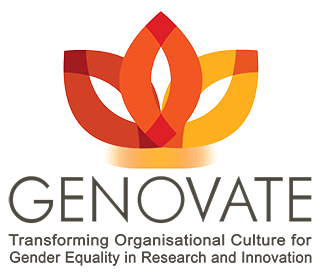 The GENOVATE Community is a platform which enables GENOVATE partners to share institutional information and case studies, and facilitates the coordination of a buddy system for bench learning.
The GENOVATE Community is a platform which enables GENOVATE partners to share institutional information and case studies, and facilitates the coordination of a buddy system for bench learning.
The GENOVATE Community consist of seven GENOVATE partner institutions; the GENOVATE International Advisory Board; key strategic collaborators and stakeholders and the general public. It is a mechanism designed to facilitate meaningful knowledge exchange across the community at local, national and international levels within each of the partner institutions’ countries, across Europe and globally.

UNINA team has agreed with the UNINA FedOAPRESS, the institutional Publishing House of UNINA, to create a book series on "Gender, Science and Society", with the UNINA Gender Budget being the first volume of the series.
This book series aims to construct bridges among different perspectives on issues related to women’s participation in science and in academic professions and organizations in order to articulate a comprehensive treatment of similarities, differences and interactions through and within disciplines and research domains, while linking specific institutional mechanisms and dynamics to broader societal ones.
Three perspectives at least seem to be relevant to this aim: research on gendered societal relations; research on the social organization of science and academy; research on the globalization of the productive relationships and resources of science and techno-science.
The book series will host:
a) Research and theoretical works integrating the gender dimension in the study of systems of scientific knowledge production, transmission, transfer and communication, bridging women’s and gender studies with science, society and technology studies.
b) Studies about research evaluation systems and their differential impact on gender equity; studies that explore exploring criteria and procedures giving value to different dimensions of research quality and excellence; studies that value accounting for the contribution of diversity to in scientific knowledge production and development.
c) Quantitative analyses about women’s participation in science and academy; horizontal and vertical gendered segregation across and within disciplines; differential career paths and opportunities; proposals of gender-sensitive statistical tools and indicators systems; scientific and academic organizations’ gender budgets.
d) Qualitative inquiries into attitudes and behaviours of scientists and researchers related to gender climate and gendered practices in the labs and in research teams; related to the perception of the gender issue in science; related to the perceived relevance of the gender dimension in the production of scientific knowledge, in teaching practices, in knowledge dissemination, communication and use.
e) Research studies about career paths and their gendered structure and about practices aimed at changing structural mechanisms and implicit stereotypes playing against the underrepresented gender.